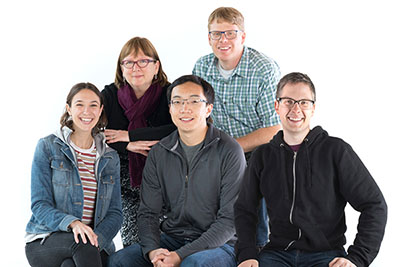SESP Facilitates Donation of Learning Games
 The School of Education and Social Policy’s Office of Community Education Partnerships helped facilitate the donation of approximately 9,200 Osmo sampler kits to children and educators in Evanston and Chicago, including Evanston/Skokie School District 65, Chicago Public Schools (CPS), and community organizations.
The School of Education and Social Policy’s Office of Community Education Partnerships helped facilitate the donation of approximately 9,200 Osmo sampler kits to children and educators in Evanston and Chicago, including Evanston/Skokie School District 65, Chicago Public Schools (CPS), and community organizations.
The donation, valued at $92,000, was made by Osmo Cares, the charitable program of Osmo, which makes educational hands-on learning games that teach literacy, math, coding, drawing, spatial skills, and more. Kids play with Osmo by manipulating physical objects in front of a digital world shown on their iPad or Fire tablets. Most Osmo games are designed for ages 5–12.
When the COVID-19 pandemic first closed schools in March, the Osmo team began brainstorming ways to help schools and families. Northwestern University alumnus Felix Hu, Osmo’s director of products, reached out to his former advisor and mentor, Mike Horn, for advice on how to provide schoolchildren with free access to Osmo's games.
While working in Horn’s Tangible Interaction Design and Learning (TIDAL) lab, Hu helped create an educational game to teach young children computer programming. This game, Coding Awbie (formerly Strawbie), is now part of the Osmo system.
 Horn connected Hu with the Center for Excellence in Computer Science Education, which is housed within the School of Education and Social Policy’s Office of Community Education Partnerships. The team leveraged its partnerships with Chicago Public Schools, city agencies, and community organizations to connect them to Osmo, which made a significant donation to youth and families throughout Chicago. These collaborations focus on increasing computer science, coding, and STEM opportunities for children and educators.
Horn connected Hu with the Center for Excellence in Computer Science Education, which is housed within the School of Education and Social Policy’s Office of Community Education Partnerships. The team leveraged its partnerships with Chicago Public Schools, city agencies, and community organizations to connect them to Osmo, which made a significant donation to youth and families throughout Chicago. These collaborations focus on increasing computer science, coding, and STEM opportunities for children and educators.
The Center for Excellence in Computer Science Education, a partnership with Apple’s Everyone Can Code and App Dev with Swift programs and CPS, also identified possible recipients through its ongoing work looking at the computer science and coding infrastructure in Chicago, said Mia Harris, program manager.
The Osmo sampler kit, valued at $10, includes the Osmo base which is designed to hold an iPad or Kindle; a reflector, which allows Osmo to read a device and its surrounding area; and indefinite access to seven different games and apps.
“The kits went to organizations that have a strong focus on youth development, agency, and opportunity within computer science, coding, and STEM education,” Harris said.
Kits were distributed as follows:
-
CPS’s Office of Computer Science received 5,000 kits; another 2,000 went to the Youth Services Division of the Chicago Department of Family and Support Services;
-
Project Exploration, a community non-profit working “to change the face of science” by encouraging those who traditionally haven’t pursued scientific careers, received 500 Osmo kits
-
The Joseph E. Hill Education Center at Evanston/Skokie School District 65 received 400 Osmo kits.
-
At Northwestern, the School of Education and Social Policy’s Office of Community Education Partnerships distributed 900 kits among two programs: Digital Divas, which provides STEM programming and support for middle school girls and their parents; and the Baxter Center for Science Education, which offers teachers high caliber science training and resources.
-
The Masters of Science in Education program at the School of Education and Social Policy received 400 kits for teacher candidates.
Osmo’s games teach abstract concepts by connecting them to objects and actions in the physical world. In Coding Awbie, for instance, players learn how to write lines of code by connecting and arranging physical coding blocks. In Pangram, players think through spatial relations to build increasingly complex shapes from smaller ones.
“We know that for younger kids, interaction with the physical world is very important to learning," said Horn, associate professor of learning sciences and computer science.
Last fall, Chicago Public Schools offered kindergarten through 8th grade teachers training on how to use Osmo in their classrooms—for remote and in-person instruction.
About the Center for Excellence in Computer Science Education: The CECSE develops, implements, and tracks equitable in-school and out-of-school computer science and coding education for children and adults. The team designs effective, sustainable, and scalable models in educator professional learning and advanced level computer science curricula and programs for youth throughout communities in Chicago.
About Osmo: Osmo is an award-winning STEAM brand whose products are used in more than 30,000 classrooms and 2.5 million homes. The company brings physical tools into the digital world through augmented reality and its proprietary reflective artificial intelligence. Founded in 2013 by ex-Google engineers Pramod Sharma and Jerome Scholler, the Osmo Play System fuses digital gameplay and physical interaction. Learn more at playosmo.com. For schools, visit playosmo.com/schools.
TIDAL lab members pictured (left to right): Ariel Zekelman (Tangible Play), Frances Judd (Bennett Day School), Felix Hu (Tangible Play), Michael Horn (Northwestern), Eric Uchalik (Tangible Play)